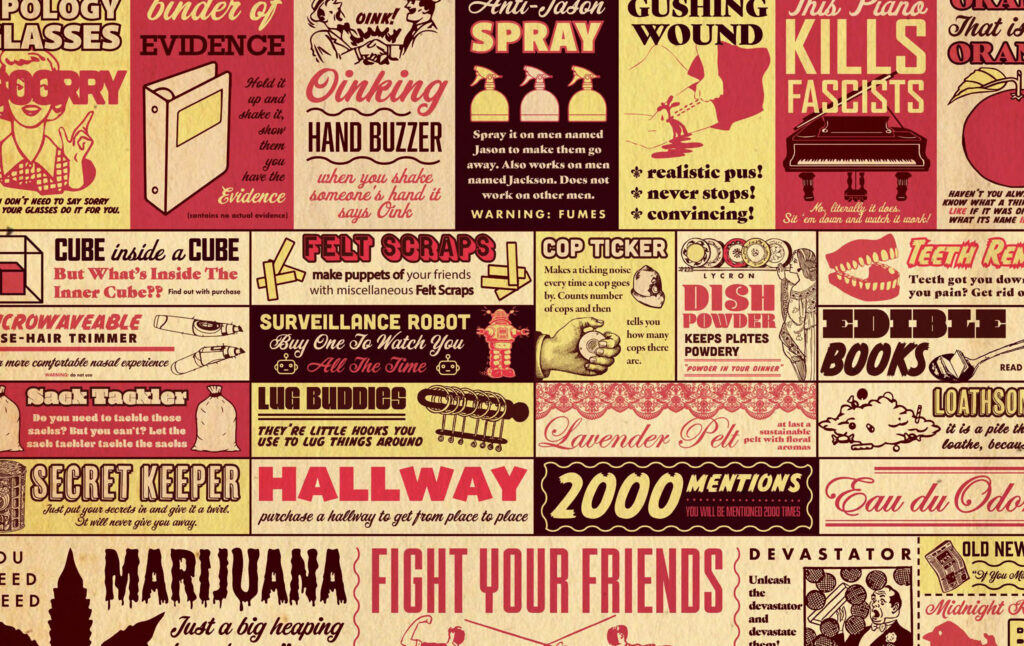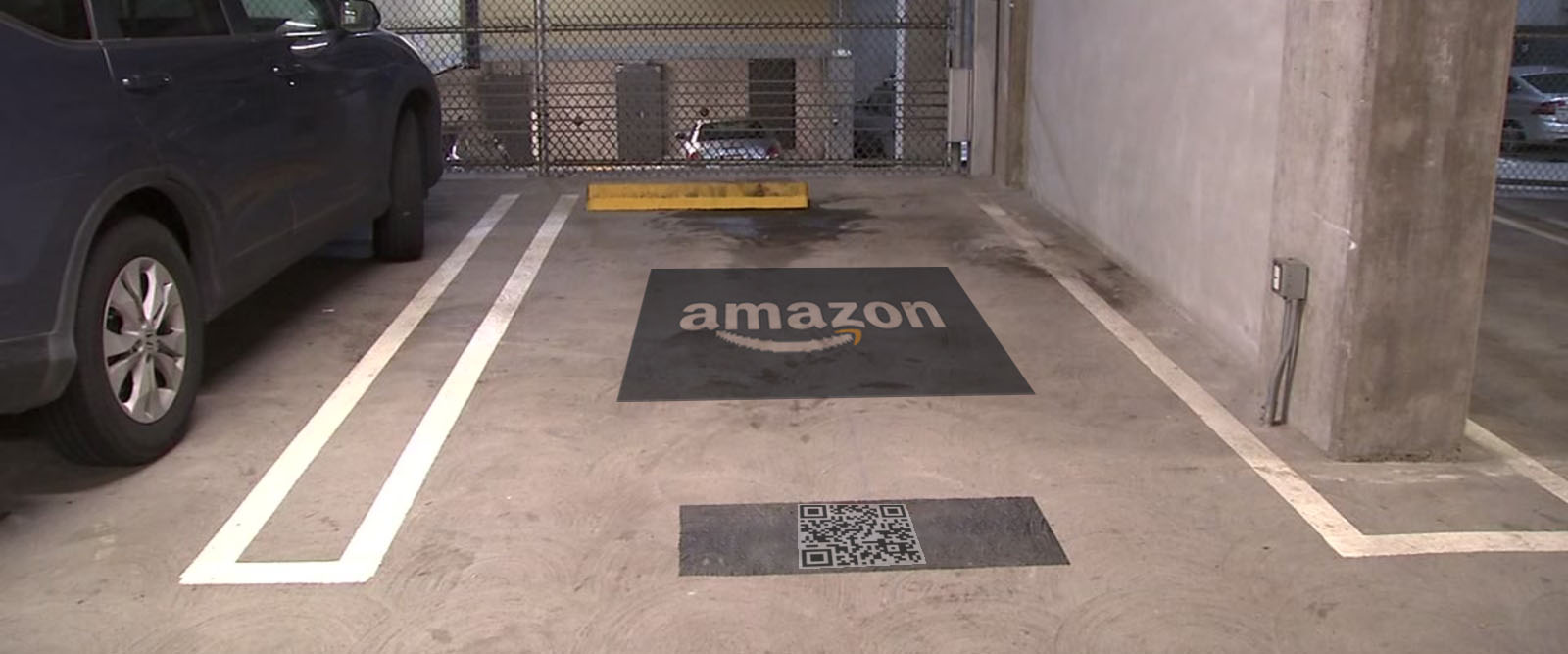
Three Suggestions For How Advertising Can Become More Intrusive
The “win-win” logic of advertising makes its spread almost impossible to curb.
If you have stopped at a gas station or gotten in a taxicab in the last few years, you may have found yourself confronted with a television screen blaring commercials. Sometimes they also air 30-second clips of Jimmy Fallon or something to make it appear as if you are watching a TV channel, but generally it’s just extremely noisy advertising. In cabs, you can turn the volume down—I am not sure about the gas station ones—but they’ve certainly altered the experience of these places. (By the way, at least in New York, cab drivers don’t even get a cut of the ad revenue.)
But since not many people get in taxicabs these days, I would like to propose several new methods for putting more ads in front of more eyeballs. They came to me in a dream. They are not Satire, and not particularly extreme—in fact, I think they are the inexorable result of following the prevailing economic ideology through to its logical conclusion. They might even exist already for all I know. If not, give it five minutes.
Parking Spaces

Instead of parking meters, have private companies lease the rights to individual parking spaces. When the driver stops, they scan a QR code on the space with their phone. (If you have no smartphone you cannot park.) They have to watch a 30 second ad on their phone. Then their time starts and the parking fee is debited (plus a processing charge).
Bathroom Stalls

Just install a screen on the inside of stall doors that shows ads on a continuous loop. The revenue from advertising can be used to cover the costs of maintaining the lavatory. It will probably result in cleaner toilets with more frequent upgrades! Everybody wins.
Doors

Put a TV screen in a door, and lock the door. When someone approaches, a 30-second advertisement begins playing. When the ad is completed, the door unlocks automatically, and the person may pass through. We can even build an entire new city that contains a series of doors that function as gates, and to get to different parts of the city you have to watch ads.
Actually, if we really want to maximize people’s freedom, we can always introduce a “pay or view” alternative: pay $1.00 to skip the ad and use the door immediately, or wait until the ad completes and pass through for free. Ooh, how about this? Instead of toll booths on highways, have it so that you have to stop in a booth and watch an ad. If you pay a fee, you get to pass through immediately, but if you stop and watch the ad it’s free! (The fee is deducted automatically using your smartphone, which will track whether you stopped or not.) Also, why don’t we have pay-per-use sidewalks? Also why isn’t each square of sidewalk sold as advertising space? Seems like wasted space. Also, why don’t we charge for bathrooms in the first place? Many countries do this, because otherwise the people who use the bathrooms are not contributing to their upkeep, which is unfair! Also, why haven’t we sold mining rights on the moon yet? It would raise tax revenue that could be used to end poverty. If you don’t want to auction the moon, you do not care about poverty.
You may think that these ideas sound horrible and that in the preceding paragraph I am beginning to sound deranged. I would agree with you. But there are plenty of economists and “entrepreneurs” who might not think this sounds deranged at all, or at least might not be able to clearly articulate why it’s deranged. After all, many of these proposals simply involve applying very mainstream ideas about how “value” is produced. They are not very different from things that already exist.
Advertising is everywhere, and one reason it’s everywhere is that it has an incredibly compelling argument in its favor. It is considered “win-win-win,” that is: The entity taking out the ad wins, because their product is promoted. The entity selling the ad space wins, because they get revenue. And the consumer seeing the ad wins, because they receive information about a thing they wouldn’t have known about otherwise, and which they are then Free To Choose whether to buy or not.
Current Affairs has no advertising either on our print edition or on our website. Instead, we have satirical fake ads. This is in part because we do not want to be beholden to or dependent on some other entity’s money; the only people whose opinions we need to care about are those of our subscribers, and no advertiser can threaten to take their business elsewhere if we publish an article they don’t like. Having no ads has also insulated our revenue during the pandemic: Many publications have seen ad revenue collapse completely overnight. We, having no ads, have not, and have therefore not had to cut back on anything.

And yet: Looked at another way, the argument for an ad-free magazine is actually rather weak. We do, after all, sometimes advertise our own products on the Current Affairs site. We tell people about the posters and the books, and when we have tote bags we’ll encourage readers to buy the tote bags. Nobody gets dividends or profits from Current Affairs, but these sales raise money to pay for more articles and more art and more editing. Why not feature advertisements for other people’s products, so long as we think those products are good and trust those people not to try to meddle with our content? This would be win-win-win: they’d get their product seen by our readers, we would get ad revenue, and our readers would not only be exposed to other things they might like to purchase, but would save money, because we could charge less for Current Affairs subscriptions if our revenue was ad-based rather than subscription-based. Confronted with this argument, I retreat into a highly unpersuasive insistence that advertising is just instinctively repugnant to me and aesthetically obnoxious and the site must be kept pristine.
But unless you are a stubborn ass like me, who refuses to accept Simple Logic, how are you not going to take the Devil’s Bargain of advertising? Consider public transit. Here is a really cool Moscow subway station:

As you can see, where these walls might have advertisements, they are instead covered with bas-reliefs. This station would lose a lot if monitors were put up under every bas-relief displaying video advertisements. It would spoil the whole look. And yet: Consider the dilemma that a public transit authority may find itself in. We have, on the one hand, a beautiful subway station. On the other hand, what if tax revenues are down and introducing advertising in public transit would bring in millions per year in revenue? It’s “free money” that could be used to improve the subway. And if it’s just advertising for plays and online learning courses and perhaps the occasional vitality supplement, what’s the harm?
The compelling “logic” of accepting advertising is one reason why so much public transit is, in fact, completely covered in it. Yes, there may be greater aesthetic coherence to a space that is completely as its architects intended it to be, rather than sullied with garish promotions. There may be something more spiritually nourishing about a space completely devoted to its core purpose, rather than intruded upon by the motive of corporate profit-seeking. But these are unquantifiable values. They are hard for a transit authority facing a budget deficit to give much weight to.
I am fascinated and disturbed by the way that certain grotesque features of capitalism seem to be so inescapably “logical,” once you accept some basic premises. Even many liberals tacitly accept, to one degree or another, ideas like: (1) something’s price is a good measure of its worth, (2) quantitative consumption of goods and services is a solid qualitative measure of human well-being, (3) everything has its price and the only question is whether we are honest enough to admit what that price is, (4) that which is made on the principles of “freedom of contract” and “non-aggression” is truly free, (5) it is legitimate for individuals to act as rational self-interested maximizers, and the pursuit of individual benefit creates a collective good, (6) profit-seeking businesses in a free market, being motivated to satisfy consumer preferences, engage in mutually beneficial transaction (7) the amount someone is willing to pay is a reflection of their desire for a thing. Of course, accept all these, and you’d end up putting billboards on the walls of the Grand Canyon, justifying Amazon’s exploitative treatment of warehouse workers, charging fees to go to the beach, having a bureaucratic nightmare of a private insurance system, justifying price gouging as “efficient,” celebrating the “flexibility” of zero-hours contracts, wanting to eliminate the public education system because it doesn’t efficiently train for the job market, seeing a bidding war over essential medical supplies as a contest to find who wants them the most, et cetera. And, of course, you’ll end up implementing all my terrible ideas about privatizing the sidewalks and the parking spaces and charging for the bathroom stalls. Follow this “simple logic” and you’ll create a dystopia, one built slowly but steadily from bricks of Pure Reason.
My favorite holiday, as I have said before, is Mardi Gras. This is for about a billion reasons, including the fact that I get to dress like a giant flamingo and nobody looks at me strangely. But one fascinating thing about Mardi Gras is its defiant rejection of economic logic. There are about 50 parades during Mardi Gras, and not a single one of them has corporate advertising. It’s banned. This makes little economic sense: People have to pay a fortune to build their floats, and they could get those floats subsidized if they’d just allow an ad here and there! It could lead to bigger, better floats. Everyone would win! But it would obviously be a hideous violation of the Spirit Of Mardi Gras, one rule of which is that things must be done in the spirit of pure joy, and not as a means to some non-Mardi Gras related end. This past Mardi Gras, I severely offended a man dressed as King Neptune when I offered him some money to participate in a photoshoot. He would have done it, he said, if I had not offered money. Since I had, though, he refused and stormed away. Mardi Gras is not about money.
Resisting advertising, then, requires having a somewhat spiritual sense of what things should be and what they should be about. A sidewalk is about the pleasure of walking, and should not be spoiled by transactions of any kind. A bathroom is about evacuating your waste, and you should not need to think about paying for anything or being subjected to propaganda. A gas station should be about pumping gas, and a ride in a taxi about getting from one place to another. Current Affairs is about Current Affairs, and nothing else, which is why we must be pure and uncompromised. And our public transit stations should be beautiful and ad-free, so that what you appreciate when you are in them is the splendor of their architecture rather than the message from their sponsor. Advertising seems win-win-win, but it is not, because we lose out on the ability to have undiluted experiences. This is true even if you end up wanting the hamburger or signing up for the distance learning course. Until we start thinking with a different kind of logic, one that values the unquantifiable and impressionistic, rather than performing a utilitarian calculus that conflates price and value, the world will become uglier and uglier and sublime experiences will disappear one by one.




